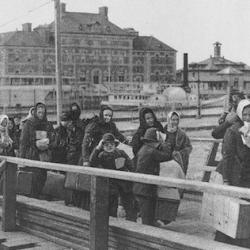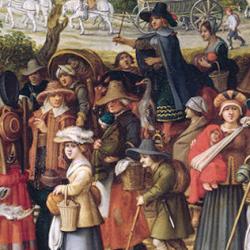Donald Trump’s position paper makes the case for strong borders: “A nation without borders is not a nation. A nation without laws is not a nation. A nation that does not serve its own citizens is not a nation.”
Pat Buchanan calls it an “invasion” and says that the issue is nothing less than the survival of Western civilization: “Will the West endure or disappear by the century’s end as another lost civilization? Mass immigration, if it continues, will be more decisive in deciding the fate of the West than Islamist terrorism. . . . Either Western nations take tough measures to secure their borders, or the Western nations will be swamped. The character of their countries will be altered forever, and smaller countries will become unrecognizable. And as this is happening, ethnic and racial clashes will become more common, as they are now becoming across Europe.”
For Buchanan, this isn’t just the issue of the 2016 Presidential race, but the question of the 21st century.
Let’s grant that it’s an “invasion.” Let’s grant that it threatens the foundations of European civilization. Let’s grant that it might be an event of world-historical proportions, and that it’s possible that it could bring unimaginable anarchy.
All that may well be true, but we can still ask: What would Augustine say?
After all, Augustine and his contemporaries lived through a similar period. Civilization itself was endangered by the barbarian peoples migrating and fighting their way into the empire.
Augustine might suggest, first of all, that the invasion has something to do with the moral evil of the invaded. That is, he would remind us that God is the Judge of the earth, and that even America is accountable for her sins. If this “invasion” is God’s judgment, it’s not going to be stopped by a wall, no matter how thick the wall is.
He would remind us that our savagery to our own citizens, including the most vulnerable of the vulnerable, surpasses any savagery that the invaders might cause. He reminded the Romans of their civil wars, and then asked: “What fury of foreign nations, what barbarian ferocity, can compare with this victory of citizens over citizens? Which was more disastrous, more hideous, more bitter to Rome: the recent Gothic and the old Gallic invasion, or the cruelty displayed by Marius and Sylla and their partisans against men who were members of the same body as themselves? The Gauls, indeed, massacred all the senators they found in any part of the city except the Capitol, which alone was defended; but they at least sold life to those who were in the Capitol, though they might have starved them out if they could not have stormed it. The Goths, again, spared so many senators, that it is the more surprising that they killed any. But Sylla, while Marius was still living, established himself as conqueror in the Capitol, which the Gauls had not violated, and thence issued his death-warrants; and when Marius had escaped by flight, though destined to return more fierce and bloodthirsty than ever, Sylla issued from the Capitol even decrees of the senate for the slaughter and confiscation of the property of many citizens. Then, when Sylla left, what did the Marian faction hold sacred or spare, when they gave no quarter even to Mucius, a citizen, a senator, a pontiff, and though clasping in piteous embrace the very altar in which, they say, reside the destinies of Rome? And that final proscription list of Sylla’s, not to mention countless other massacres, dispatched more senators than the Goths could even plunder” (City of God, 3.29).
Augustinian church historians like Kenneth Scott Latourette would remind us that the religion and culture of the barbarian invaders began to disintegrate as they invaded more deeply into the Roman empire, opening opportunities for the church to evangelize.
Above all, Augustine would remind us of that the church survives invasion, and can even prosper. For all its faults, Augustine admired Roman civilization, but he knew that the kingdom of God wasn’t staked on its preservation. A good reminder in the face of today’s “invaders,” if that’s what they are.















